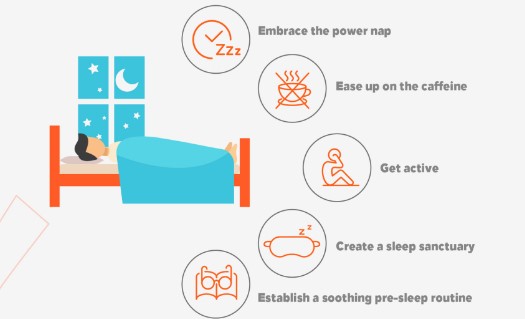Improving sleep quality naturally involves adopting healthy habits and creating a relaxing environment that promotes rest. Here are several strategies to consider:
Establish a Consistent Sleep Schedule
Your body operates on an internal clock, or circadian rhythm, that regulates sleep-wake cycles. Go to bed and wake up around the same time every day, even on weekends, to help synchronize this rhythm. Consistency is key to feeling rested and falling asleep easily.
Optimize Your Sleep Environment
Your bedroom should be a haven for sleep. Ensure it’s dark, quiet, and cool. Invest in blackout curtains, earplugs, or a white noise machine to minimize distractions. Maintain a comfortable temperature, ideally between 60-67 degrees Fahrenheit. A comfortable mattress, pillows, and bedding are also essential.
Limit Screen Time Before Bed
The blue light emitted from electronic devices like smartphones, tablets, and computers can interfere with melatonin production, a hormone that regulates sleep. Avoid using these devices at least an hour or two before bedtime. If you must use them, consider using blue light filters or apps that reduce blue light emission.
Watch Your Diet and Exercise Habits
What you eat and when you eat can significantly impact your sleep. Avoid large meals, caffeine, and alcohol close to bedtime. Caffeine and alcohol can disrupt sleep patterns, while large meals can cause discomfort and indigestion. Regular physical activity is beneficial for overall health and can improve sleep quality, but avoid intense workouts close to bedtime. Aim to exercise earlier in the day.
Practice Relaxation Techniques
Stress and anxiety can make it difficult to fall asleep and stay asleep. Incorporate relaxation techniques into your bedtime routine. These may include:
- Meditation: Focus on your breath and clear your mind of racing thoughts.
- Deep Breathing Exercises: Slow, deep breaths can help calm your nervous system.
- Progressive Muscle Relaxation: Tense and relax different muscle groups to release tension.
- Gentle Stretching or Yoga: Promotes relaxation and reduces muscle stiffness.
- Reading: A relaxing book (not a thriller!) can help you unwind.
Consider Natural Supplements (with caution)
Certain natural supplements may promote sleep, but it’s essential to consult with a healthcare professional before taking them. Melatonin, magnesium, valerian root, and chamomile are commonly used sleep aids. However, they can interact with medications or have side effects, so guidance is crucial.
By implementing these strategies consistently, you can significantly improve your sleep quality naturally and wake up feeling refreshed and energized.



